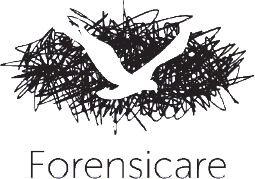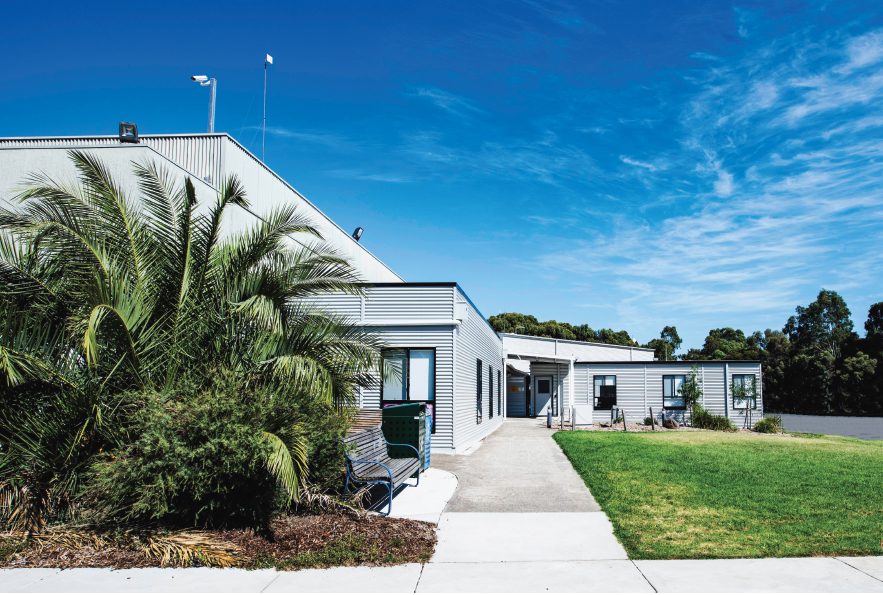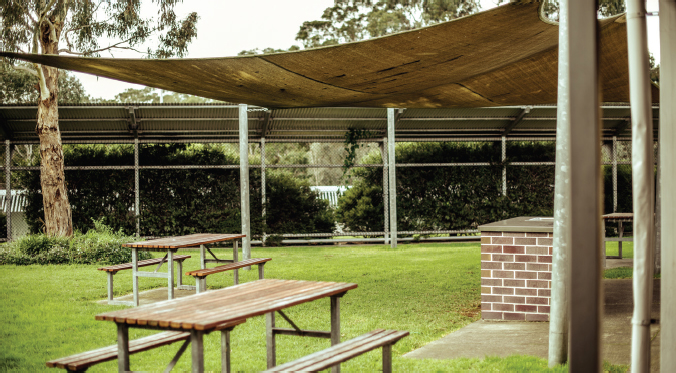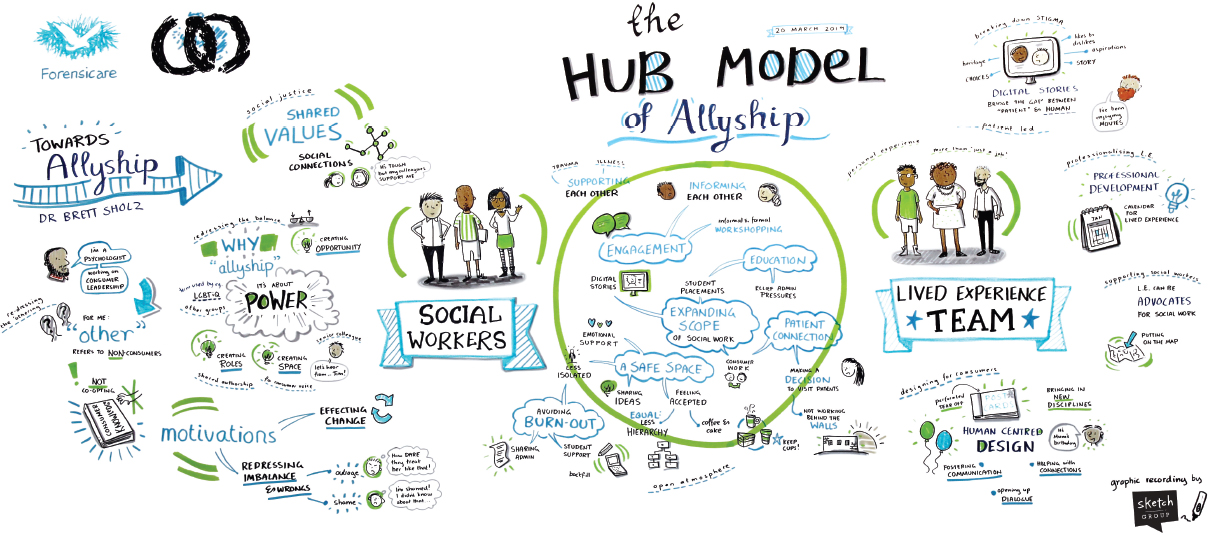7. Forensicare RMIT Social Work partnership: Flourishing through the pandemic

Forensicare (Victorian Institute of Forensic Mental Health) is a statutory agency and the primary state-wide specialist provider of adult forensic mental health services in Victoria. It sits at the nexus of the mental health and criminal justice systems, providing forensic mental health services for people with a serious mental illness involved in the criminal justice system. Forensicare also works with people at risk of offending, who pose a serious risk to themselves or others, and with people referred from the general mental health system for specialist advice or treatment.
 Image 6 Forensicare Entrance © Forensicare.
Image 6 Forensicare Entrance © Forensicare.
This image is used in this book with the permission of Forensicare and is not to be reproduced without permission. For more information, go to https://www.forensicare.vic.gov.au/.
Forensicare services are delivered through three interconnected streams. The first stream is at Thomas Embling Hospital (TEH), where care and treatment is offered to people classified as forensic patients (consumers found not guilty or unfit to stand trial under the Crimes (Mental Impairment and Unfitness to be Tried) Act 1997; security patients (consumers in prison requiring hospital treatment for mental health disorders); or civil patients (consumers from the community who require secure hospital treatment for their mental health. The second stream is specialist forensic mental health services provided across several Victorian prisons. These services are provided at acute, sub-acute and rehabilitation levels of care and include the Community Integration Program (CIP) to support people with a serious mental illness as they transition from prison into the community. All Forensicare prison mental health services are voluntary. The third stream is Forensicare’s Community Forensic Mental Health Services (CFMHS), which provides programs and services for people who have a serious mental illness who have offended, or are at risk of offending, as well as those transitioning from TEH into the community. Specialist assessment and treatment is also provided for people who present with a range of serious problem behaviours.
Social work practice in forensic mental health is located at the intersections of the criminal justice and mental health systems. It involves interaction with the courts, community corrections and prisons, youth justice, and mental health services, as well as a wide range of health and welfare services connected to housing, income support, education and employment, disability and aged care services, and alcohol and other drugs. Social workers employed in forensic mental health must balance a range of so-called ‘care’ and ‘control’ issues. Specifically, they need to consider the needs of consumers, as well as the needs of families, carers, and victims in conjunction with assessing and responding to risks of harm to self and others. Of course, this is complex and people cannot be neatly categorised or labelled. Many ‘consumers’ are also ‘victims’, having experienced violence and trauma in their lives. Similarly, members of consumers’ ‘family’ may also be ‘victims’ or ‘offenders’ of crime, and some do not identify as ‘carers’. Social workers need to identify, assess and manage risk; challenge discriminatory structures and practices; engage effectively in relationships with consumers and their families and carers; and identify, develop and implement strategies for intervention.

Image 7 Forensicare Canning Courtyard © Forensicare.
This image is used in this book with the permission of Forensicare and is not to be reproduced without permission. For more information, go to https://www.forensicare.vic.gov.au/.
At Forensicare, social workers take an explicit person-in-environment perspective and a collaborative, strengths-based approach to working with consumers, families and carers. They aim to address both individual needs and risks, while also challenging structural inequalities that hinder personal recovery and contribute to the stigmatisation of people in forensic mental health. Social workers work in multi-disciplinary teams, contributing to all major stages of consumer care pathways:
- Assessment – of individual strengths, needs and risks, family violence, child safeguarding, nexus between offending behaviour and mental illness, using accessible language;
- Planning – develop and contribute to long and short-term care plans that respond to the person-in-environment and are orientated towards personal, clinical, wellbeing and offence-specific recovery and meaningful community integration;
- Intervention – provide appropriate direct rehabilitative interventions (e.g. individual or group work, family work) and indirect interventions (e.g. reports, service referrals, brokerage, case and service coordination, advocacy to access mental and other health assessment and treatment, housing, legal, financial, and alcohol and other drug services), and identify and advocate the least restrictive option commensurate with community safety;
- Review – monitor, evaluate and adjust care plans in response to changing individual or environmental needs and circumstances, in collaboration with consumers, families and other professionals.
The social workers manage interagency negotiation and networking across professional boundaries, making links with local services and communities and identifying resources for consumers, families and carers. They engage with consumer, carers and families to ensure they understand how systems operate and their rights within those systems.

Image 8 Forensicare Even on your darkest days…There’s always hope © Forensicare.
This image is used in this book with the permission of Forensicare and is not to be reproduced without permission. For more information, go to https://www.forensicare.vic.gov.au/.
Forensicare Social Work has been hosting RMIT students on placement since 2010, through a combination of traditional direct practice social work placements and more contemporary, innovative approaches to engaging in macro-level practice and practice-based research. This year was no exception, despite the numerous and substantial disruptions to service caused by the Covid-19 pandemic and multiple, lengthy lockdowns in Victoria. In semester 2, 2021, three final-year social work students from RMIT undertook their placement at Thomas Embling Hospital. They were each placed on different units with different social work Task Supervisors and Field Educators for 3-4 days of each week, undertaking direct practice with consumers. For the remaining 1-2 days of each week, students worked on a practice-based research project.
 Image 9 Forensicare Hub Model of Allyship © Forensicare.
Image 9 Forensicare Hub Model of Allyship © Forensicare.
This image is used in this book with the permission of Forensicare and is not to be reproduced without permission. For more information, go to https://www.forensicare.vic.gov.au/.
 Image 10 Forensicare Allyship © Forensicare.
Image 10 Forensicare Allyship © Forensicare.
This image is used in this book with the permission of Forensicare and is not to be reproduced without permission. For more information, go to https://www.forensicare.vic.gov.au/.
Since 2017 social work students completing placements at Thomas Embling Hospital have contributed to a project known as Digital Bytes. The Digital Bytes project involves co-creating stories, using digital methods with consumers. The ‘bytes’ are electronically recorded or ‘digital’ short stories (3-5 mins duration), co-created by a consumer at the hospital with support from students. The consumer determines the focus of the story and often, stories are about the person’s own hopes for the future, their recovery and self-identity. This person-centred and strength-based approach aims to co-author new and positive self-narratives that challenge dominant or harmful public discourses about the nature of the person or their circumstances. The social work team at Forensicare had identified this as a complex issue affecting their client group, as well as the families and carers of these clients. Mainstream media reporting of patients within Thomas Embling Hospital is often highly sensationalised, distorting the facts of an event in order to emphasise the idea that there is some danger to society. These destructive media narratives cause enduring distress to patients and their families, who endure the double stigma of involvement in the mental health and criminal justice systems.
Research is now being conducted by a social work student from another university, with combined support and supervision from Forensicare and RMIT Social Work, to obtain a better understanding of the impact and utility of the Digital Bytes project at Thomas Embling Hospital. Semi-structured interviews will be conducted with Forensicare staff and previous social work students involved in the development of the Digital Bytes. A thematic analysis will be conducted to identify patterns in the data.
In 2021, Social Work students from RMIT also played an essential role in re-establishing the Thomas Embling Hospital Consumer Advisory Group (CAG), which is an essential part of the Consumer Participation Program at Forensicare. The CAG provides a forum to engage and consult with consumers for improving service quality through consumer input and feedback. This includes identifying service gaps and facilitating consumer collaboration with management and staff across Forensicare and incorporation of consumer perspectives in Forensicare services. The student also undertook discrete service development projects, such as a comprehensive update of the child visitation process and forms to account for legislative and policy changes related to child safeguarding and family violence. This included the development of a guide for workers to navigate the various legal complexities in this area of practice.
 Image 11 Forensicare Future Research Directions © Forensicare.
Image 11 Forensicare Future Research Directions © Forensicare.
This image is used in this book with the permission of Forensicare and is not to be reproduced without permission. For more information, go to https://www.forensicare.vic.gov.au/.
Field education at Forensicare offers RMIT students a challenging and enriched learning experience. Students develop skills in both micro- and macro-level practice through a combination of traditional casework, practice-based research, and social justice advocacy. The partnership between Forensicare and RMIT Social Work continues to flourish, characterised by an egalitarian partnership and constructive working relationship. Together, Forensicare and RMIT Social Work are promoting a co-design approach with students, staff, consumers, and families to generate new knowledge and ethical practice in forensic mental health social work and social work education.

